外研版(2019)选择性必修三 Unit 6 Nature in words Using language 课件(共39张PPT)
文档属性
| 名称 | 外研版(2019)选择性必修三 Unit 6 Nature in words Using language 课件(共39张PPT) | 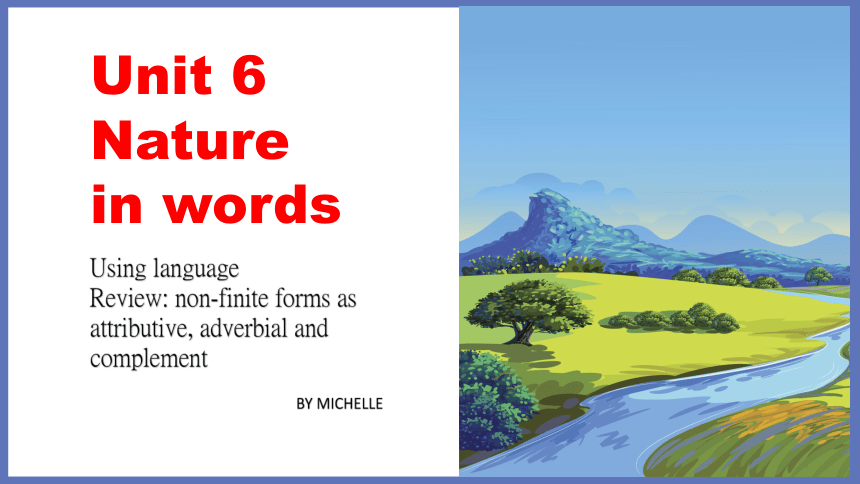 | |
| 格式 | pptx | ||
| 文件大小 | 14.0MB | ||
| 资源类型 | 教案 | ||
| 版本资源 | 外研版(2019) | ||
| 科目 | 英语 | ||
| 更新时间 | 2025-01-10 12:23:02 | ||
图片预览

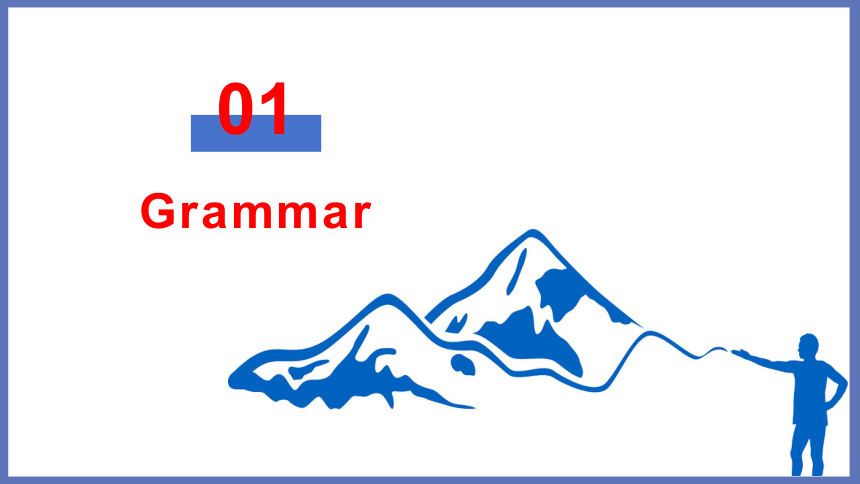
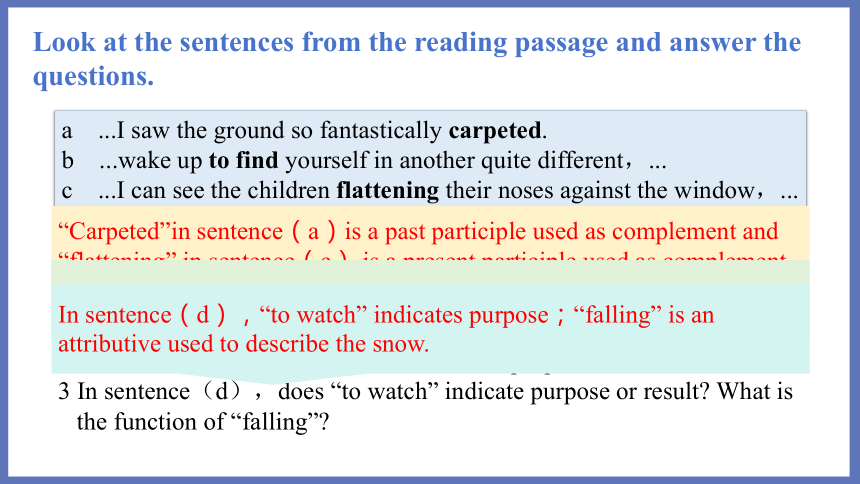
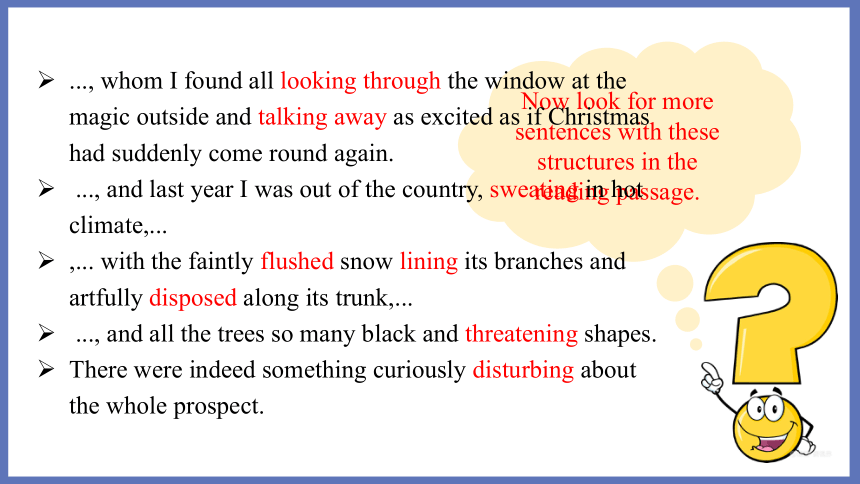



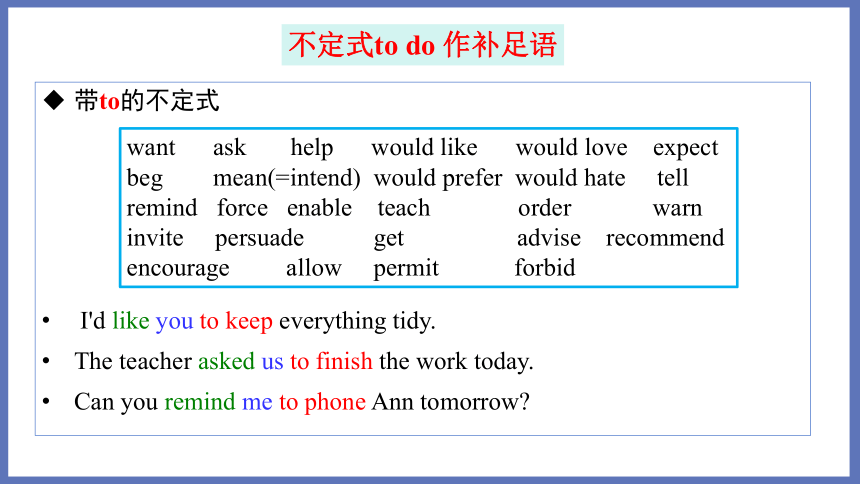
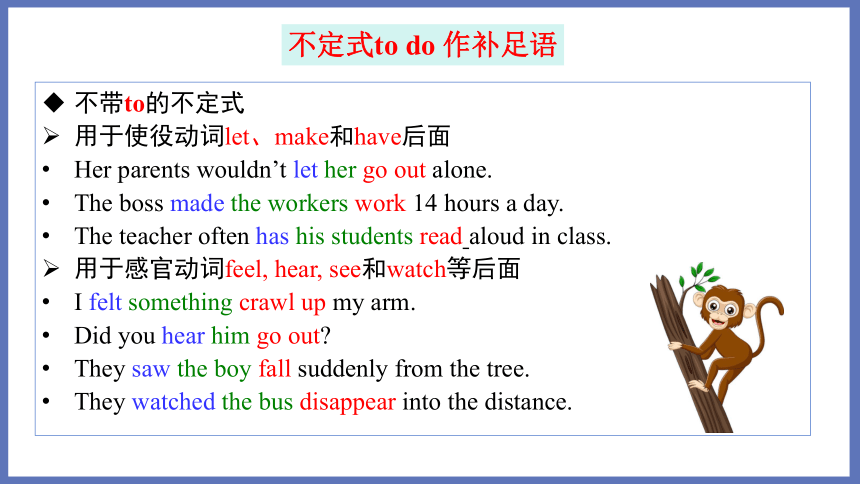
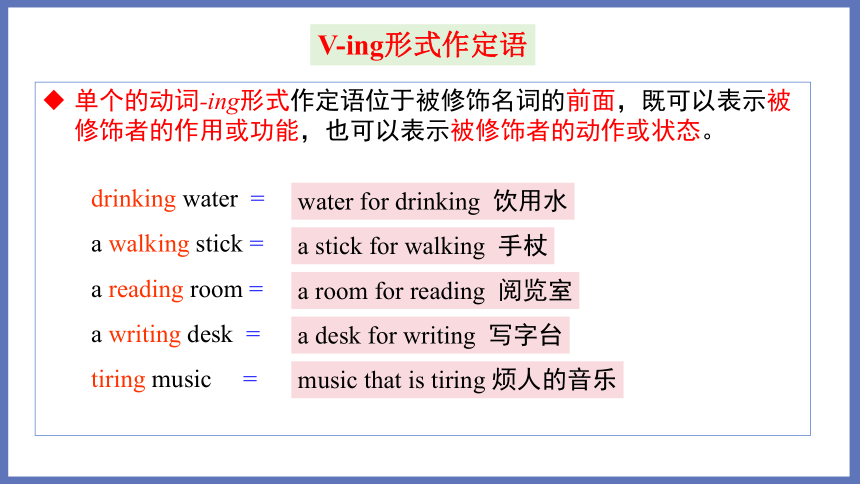

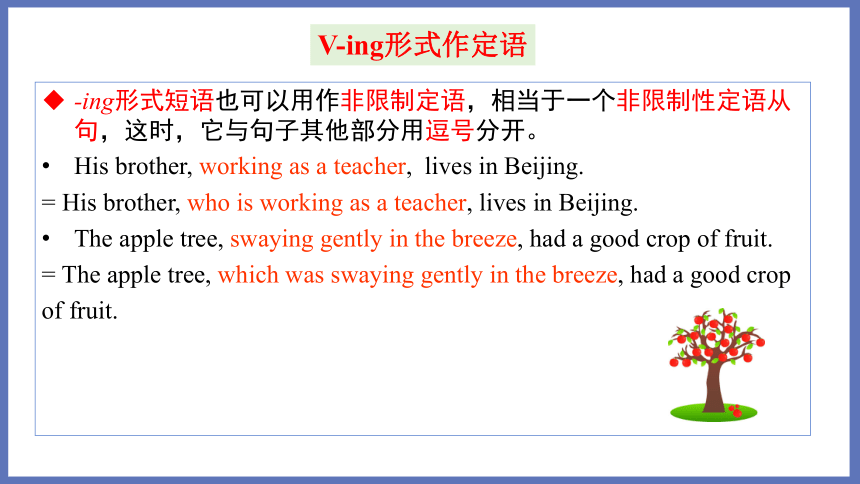
文档简介
(共39张PPT)
BY MICHELLE
Unit 6
Nature
in words
Using language
Review: non-finite forms as attributive, adverbial and complement
Grammar
01
Look at the sentences from the reading passage and answer the questions.
a ...I saw the ground so fantastically carpeted.
b ...wake up to find yourself in another quite different,...
c ...I can see the children flattening their noses against the window,...
d ...flattened my nose against the cold window to watch the falling snow...
1 What is the difference between the verbs in bold in sentences(a)and(c)
2 In sentence(b),does “to find” indicate purpose or result
3 In sentence(d),does “to watch” indicate purpose or result What is the function of “falling”
“Carpeted”in sentence(a)is a past participle used as complement and “flattening” in sentence(c) is a present participle used as complement.
In sentence(b),“to find” indicates result.
In sentence(d),“to watch” indicates purpose;“falling” is an attributive used to describe the snow.
Now look for more sentences with these structures in the reading passage.
..., whom I found all looking through the window at the magic outside and talking away as excited as if Christmas had suddenly come round again.
..., and last year I was out of the country, sweating in hot climate,...
,... with the faintly flushed snow lining its branches and artfully disposed along its trunk,...
..., and all the trees so many black and threatening shapes.
There were indeed something curiously disturbing about the whole prospect.
Review: non-finite forms as attributive, adverbial and complement
非谓语动词
非谓语作主语
非谓语作宾语
非谓语作表语
非谓语作定语
非谓语作状语
非谓语作补足语
不定式to do
动名词/
现在分词doing
过去分词done
不定式to do 作定语
不定式作定语通常放在其修饰的名词或代词之后。
Is this the best way to help him
Your wish to be a teacher is quite understandable.
不定式作定语与被修饰的名词或代词之间是主谓关系、动宾关系、同位关系或修饰关系。
The next train to arrive was from Chengdu.
Please give me something to drink.
We students should have the courage to face any difficulty.
Now it is time to begin our class.
不定式to do 作状语
动词不定式作状语时,可以表示谓语动作发生的原因、目的、结果。
He came here to attend an important meeting.
Sam was very surprised to hear the news.
He went home to find his old friend George waiting for him.
目的
原因
结果
不定式to do 作补足语
带to的不定式
I'd like you to keep everything tidy.
The teacher asked us to finish the work today.
Can you remind me to phone Ann tomorrow
want ask help would like would love expect
beg mean(=intend) would prefer would hate tell
remind force enable teach order warn
invite persuade get advise recommend
encourage allow permit forbid
不定式to do 作补足语
不带to的不定式
用于使役动词let、make和have后面
Her parents wouldn’t let her go out alone.
The boss made the workers work 14 hours a day.
The teacher often has his students read aloud in class.
用于感官动词feel, hear, see和watch等后面
I felt something crawl up my arm.
Did you hear him go out
They saw the boy fall suddenly from the tree.
They watched the bus disappear into the distance.
V-ing形式作定语
单个的动词-ing形式作定语位于被修饰名词的前面,既可以表示被修饰者的作用或功能,也可以表示被修饰者的动作或状态。
drinking water =
a walking stick =
a reading room =
a writing desk =
tiring music =
water for drinking 饮用水
a stick for walking 手杖
a room for reading 阅览室
a desk for writing 写字台
music that is tiring 烦人的音乐
V-ing形式作定语
若单个的动词-ing形式修饰的词为those, something, everything, nothing 等代词时,则-ing形式要放在其后。
He is reading something interesting.
There is nothing amazing.
V-ing形式短语作定语时,放在所修饰的名词之后,并且在意思上相当于一个定语从句。
They lived in a room facing the street.
= They lived in a room that faces the street.
The man standing there is Peter’s father.
= The man who is standing there is Peter’s father.
V-ing形式作定语
-ing形式短语也可以用作非限制定语,相当于一个非限制性定语从句,这时,它与句子其他部分用逗号分开。
His brother, working as a teacher, lives in Beijing.
= His brother, who is working as a teacher, lives in Beijing.
The apple tree, swaying gently in the breeze, had a good crop of fruit.
= The apple tree, which was swaying gently in the breeze, had a good crop of fruit.
V-ing形式作状语
V-ing形式用作状语时,可以表示谓语动作发生的原因、时间、结果、条件、伴随、让步和方式等,起作用相当于状语从句或并列句。
Walking in the street, I saw a tailor’s shop.
Being poor, he couldn’t afford a TV set.
His father died, leaving the family even worse off.
Using your head, you will find a good way.
Studying hard, he didn’t pass the exam.
He earns a living driving a truck.
He sat in the chair reading a newspaper.
时间
原因
结果
条件
让步
方式
伴随
When I walked in the street, I saw a tailor’s shop.
Because he was poor, he couldn’t afford a TV set.
His father died and left the family even worse off.
Though he studied hard, he didn’t pass the exam.
If you use your head, you will find a good way.
He sat in the chair and read a newspaper.
He earns a living by driving a truck.
V-ing形式作状语
V-ing形式作状语时,它的逻辑主语必须与主句的主语是一致的。
Looking out of the window, a cat was walking along the wall.
Looking out of the window, we saw a cat walking along the wall.
V–ing 用于某些固定搭配中,表示说话人的态度、观点等,如:generally speaking, frankly/honestly speaking, judging by/from, considering/seeing, supposing 等。
Supposing it rains, we will put off the sports meeting.
Generally speaking, boys are more interested in science than girls.
V-ing形式作补足语
see, watch, hear, feel, notice, smell等感官动词后接V-ing作宾语补足语, 表示该动作正在进行。
I didn’t notice him waiting.
I felt an ant climbing over my leg.
have, leave, keep等使役动词后接V-ing作宾语补足语, 表示“使处于某种状态”。
They shut the door and left, leaving the fire burning.
Sorry, I’ve kept you waiting a long time.
V-ed形式作定语
单个-ed作定语。
及物动词的-ed形式作定语时一般兼有被动和完成的意义。
a broken cup 一个破杯子
a wounded soldier 一名伤员
不及物动词的-ed形式作定语时只有完成意义。
a grown woman 一位成年妇女
an escaped prisoner 一名逃犯
V-ed短语作定语通常后置,其作用相当于一个定语从句。
the color TV set produced last year
= the color TV set that was produced last year
a letter written to me by my daughter
= a letter that was written to me by my daughter
V-ed形式作状语
V-ed形式用作状语时,可以表示谓语动作发生的时间、原因、条件、让步、伴随或方式,相当于状语从句或并列句。逻辑主语必须与句子的主语一致。
Asked what had happened, he kept silent.
Caught in a heavy rain, he was all wet.
Given more time, we would be able to do the work much better.
Left alone at home, the little boy didn’t feel afraid at all.
The teacher entered the classroom, followed by some students.
时间
原因
条件
让步
伴随
When he was asked what had happened, he kept silent.
Because he was caught in a heavy rain, he was all wet.
If we were given more time, we would be able to do the work much better.
The teacher entered the classroom, and he was followed by some students.
Although he was left alone at home, the little boy didn’t feel afraid at all.
V-ed形式作补足语
like, want, wish, order等后面接V-ed作宾语补足语, 表示命令或希望某件事被完成。
I want the suit made to his own measure.
He didn’t wish it mentioned.
see, hear, notice, observe, watch, feel, find等感官动词后接V-ed作宾语补足语, 表示该动作与宾语之间是被动关系或者该动作已经完成。
I saw an old man knocked down by a car just now.
have, get, make, leave, keep等使役动词后接V-ed作宾语补足语, 表示动作由他人完成。
We’re having our car repaired.
在with的复合结构中可接不定式,V-ing 和V-ed作宾语补足语。这一结构通常在句中作时间、方式、条件、原因等状语。
With a lot of work to do, he wasn't allowed to go out.
With spring coming on, trees turn green.
With prices going up so fast, we can't afford luxuries.
With water heated, we can see the steam.
The murderer was brought in, with his hands tied behind his back.
(方式)
(条件)
(原因)
(时间)
(原因)
不定式表示将发生的动作;
V-ing和前面的宾语是逻辑上的主谓关系;
V-ed和前面的宾语是逻辑上的动宾关系。
1. (2022年新高考全国Ⅱ卷)Henry Tyler made the catch of the year on the weekend. When he saw a young child hanging from a sixth-floor apartment balcony (阳台), Henry ran one hundred metres, jumped over a 1.2-metre fence, and held out his arms to catch the ____________ (fall) child.
2. (2022年全国甲卷)A visually-challenged man from Beijing recently hiked (徒步) 40 days to Xi’an, as a first step _____________ (journey) the Belt and Road route (路线) by foot.
3. (2022年全国甲卷)Inspired by the Belt and Road Forum for International Cooperation ______________ (hold) in Beijing, Cao decided to cover the route by hiking as a tribute (致敬) to the ancient Silk Road. A friend of his, Wu Fan, volunteered to be his companion during the trip.
falling
to journey
held
4. (2022年全国乙卷)“It can help to build a community with a ____________ (share) future for mankind,” he said.
5. (2020浙江)Agriculture gave people their first experience of the power of technology (change) lives.
6. (2020江苏)Technological innovation, (combine) with good marketing, will promote the sales of these products.
7. (2020课标全国Ⅱ)Picking up her “Lifetime Achievement” award, proud Irene declared she had no plans (retire) from her 36-year-old business.
8. (2020北京)Earth Day, (mark)on 22 April, is an annual event aiming to raise public awareness about environmental protection.
shared
to change
combined
to retire
marked
9. (2020课标全国Ⅱ)They represent the earth (come) back to life and best wishes for new beginnings.
10. (2020课标全国Ⅰ)Scientists have responded by (note) that hungry bears may be congregating (聚集) around human settlements.
11. (2022年新高考全国Ⅱ卷)Eric woke up a little later when he heard children playing outside. He pushed a chair onto the balcony, and climbed up ____________ (see) them.
12. (2022年全国甲卷)Now, Cao has started the second part of his dream to walk along the Belt and Road route. He flew 4, 700 kilometers from Xi’an to Kashgar on Sept. 20, ___________ (plan) to hike back to Xi’an in five months.
coming
noting
to see
planning
Complete the passage with the correct form of the verbs in brackets.
The Lake Poets were a small group of poets 1 (live)in the Lake District of England in the late 18th and early 19th centuries. The Lake District,2 (know) for its beauty,is in the north-west of England. The first of the poets 3 (come)there was Robert Southey,one of the most 4 (respect)poets of his time. He was followed by William Wordsworth,perhaps Britain’s most 5 (celebrate)19th century poet,and then Samuel Coleridge,who had written the
6 (pioneer) work Lyrical Ballads with Wordsworth. Soon,
7 (draw)both by its natural beauty and a desire to be near these famous poets,other poets came 8 (live)in the Lake District. All of these poets were seen as part of the Romantic Movement.
living
known
to come/coming
respected
celebrated
pioneering
drawn
to live
Look at the picture and complete the travel journal entry with the words in the box. Use the structures you have learnt in this unit where appropriate.
find blow go see fall relax enjoy run
Today, whilst walking along a peaceful river running through a university campus, I was amazed to find…
Talk about a travel experience of your own that brought you closer to nature,using the structures you have learnt in this unit where appropriate.
Vocabulary
Building
02
Describing nature
Read the paragraph and answer the questions. Pay attention to the words in bold.
What does this paragraph mainly describe
What aspects does the author describe
This paragraph mainly describes the beautiful appearance in the month of August.
The author describes the skies,fields,flowers,orchards,trees,wheat and the quality of the light.
Put the words in Activity 5 into the boxes. Find out what they are used to describe.
Sound
Colour
Action
Shape
Smell
Sensation
loud
clear,green
rich,golden
blooming,bend,
bow, piled,
waving,sweeps,
tinges, makes
thick clusters,
graceful
sheaves
fresh,sweet-
smelling
fresh,bleak,
gentle,soft,
pleasant
Now think of more words in each category and add them to the boxes. Then describe nature during your favourite season with the words you have learnt.
Open a dictionary,and you’ll be surprised to find that there are many more words about nature than you would think. There are various ways to describe the things we see in the natural world,no matter whether it’s a flower,an animal or the rain. For example,there are many ways to describe the different sounds of birds,such as chatter,chirp,cluck,hoot and tweet. These words can help us to write vivid descriptions of nature.
Did You Know
Listening&
Speaking
03
Listen to the conversation and answer the questions.
1 What book was the man reading
2 Why was the man annoyed
3 What was the girl’s opinion
The man was reading a book called Landmarks.
Something Robert Macfarlane wrote made him annoyed.
Going for a walk outside can cheer people up.
Listen to the conversation again and correct the mistakes in the man’s blog.
confused-annoyed
being added to-now missing from
dense forest-field of grass
fruit-blue flowers
film-blog
watching TV-on computers
literature-history
the same opinion as-a different opinion from
old words become as normal to young people as the new ones are to me-new words become as normal to young people as the old ones are to me
Now work in pairs and act out the conversation.
Complete the boxes with the expressions from the conversation.
...such as...
The main reason...
...,for instance.
Two reasons,I think.
Consider...
Giving examples Giving explanations
...such as...
...,for instance.
The main reason...
Two reasons,I think.
Consider...
Work in pairs. Talk about your opinions of the issue discussed in Activity 8 using the expressions in this section.
Review non-finite forms as attributive, adverbial and complement.
Write a journal using the non-finite as attributive, adverbial and complement.
THANKS FOR WATCHING
BY MICHELLE
Unit 6
Nature
in words
Using language
Review: non-finite forms as attributive, adverbial and complement
Grammar
01
Look at the sentences from the reading passage and answer the questions.
a ...I saw the ground so fantastically carpeted.
b ...wake up to find yourself in another quite different,...
c ...I can see the children flattening their noses against the window,...
d ...flattened my nose against the cold window to watch the falling snow...
1 What is the difference between the verbs in bold in sentences(a)and(c)
2 In sentence(b),does “to find” indicate purpose or result
3 In sentence(d),does “to watch” indicate purpose or result What is the function of “falling”
“Carpeted”in sentence(a)is a past participle used as complement and “flattening” in sentence(c) is a present participle used as complement.
In sentence(b),“to find” indicates result.
In sentence(d),“to watch” indicates purpose;“falling” is an attributive used to describe the snow.
Now look for more sentences with these structures in the reading passage.
..., whom I found all looking through the window at the magic outside and talking away as excited as if Christmas had suddenly come round again.
..., and last year I was out of the country, sweating in hot climate,...
,... with the faintly flushed snow lining its branches and artfully disposed along its trunk,...
..., and all the trees so many black and threatening shapes.
There were indeed something curiously disturbing about the whole prospect.
Review: non-finite forms as attributive, adverbial and complement
非谓语动词
非谓语作主语
非谓语作宾语
非谓语作表语
非谓语作定语
非谓语作状语
非谓语作补足语
不定式to do
动名词/
现在分词doing
过去分词done
不定式to do 作定语
不定式作定语通常放在其修饰的名词或代词之后。
Is this the best way to help him
Your wish to be a teacher is quite understandable.
不定式作定语与被修饰的名词或代词之间是主谓关系、动宾关系、同位关系或修饰关系。
The next train to arrive was from Chengdu.
Please give me something to drink.
We students should have the courage to face any difficulty.
Now it is time to begin our class.
不定式to do 作状语
动词不定式作状语时,可以表示谓语动作发生的原因、目的、结果。
He came here to attend an important meeting.
Sam was very surprised to hear the news.
He went home to find his old friend George waiting for him.
目的
原因
结果
不定式to do 作补足语
带to的不定式
I'd like you to keep everything tidy.
The teacher asked us to finish the work today.
Can you remind me to phone Ann tomorrow
want ask help would like would love expect
beg mean(=intend) would prefer would hate tell
remind force enable teach order warn
invite persuade get advise recommend
encourage allow permit forbid
不定式to do 作补足语
不带to的不定式
用于使役动词let、make和have后面
Her parents wouldn’t let her go out alone.
The boss made the workers work 14 hours a day.
The teacher often has his students read aloud in class.
用于感官动词feel, hear, see和watch等后面
I felt something crawl up my arm.
Did you hear him go out
They saw the boy fall suddenly from the tree.
They watched the bus disappear into the distance.
V-ing形式作定语
单个的动词-ing形式作定语位于被修饰名词的前面,既可以表示被修饰者的作用或功能,也可以表示被修饰者的动作或状态。
drinking water =
a walking stick =
a reading room =
a writing desk =
tiring music =
water for drinking 饮用水
a stick for walking 手杖
a room for reading 阅览室
a desk for writing 写字台
music that is tiring 烦人的音乐
V-ing形式作定语
若单个的动词-ing形式修饰的词为those, something, everything, nothing 等代词时,则-ing形式要放在其后。
He is reading something interesting.
There is nothing amazing.
V-ing形式短语作定语时,放在所修饰的名词之后,并且在意思上相当于一个定语从句。
They lived in a room facing the street.
= They lived in a room that faces the street.
The man standing there is Peter’s father.
= The man who is standing there is Peter’s father.
V-ing形式作定语
-ing形式短语也可以用作非限制定语,相当于一个非限制性定语从句,这时,它与句子其他部分用逗号分开。
His brother, working as a teacher, lives in Beijing.
= His brother, who is working as a teacher, lives in Beijing.
The apple tree, swaying gently in the breeze, had a good crop of fruit.
= The apple tree, which was swaying gently in the breeze, had a good crop of fruit.
V-ing形式作状语
V-ing形式用作状语时,可以表示谓语动作发生的原因、时间、结果、条件、伴随、让步和方式等,起作用相当于状语从句或并列句。
Walking in the street, I saw a tailor’s shop.
Being poor, he couldn’t afford a TV set.
His father died, leaving the family even worse off.
Using your head, you will find a good way.
Studying hard, he didn’t pass the exam.
He earns a living driving a truck.
He sat in the chair reading a newspaper.
时间
原因
结果
条件
让步
方式
伴随
When I walked in the street, I saw a tailor’s shop.
Because he was poor, he couldn’t afford a TV set.
His father died and left the family even worse off.
Though he studied hard, he didn’t pass the exam.
If you use your head, you will find a good way.
He sat in the chair and read a newspaper.
He earns a living by driving a truck.
V-ing形式作状语
V-ing形式作状语时,它的逻辑主语必须与主句的主语是一致的。
Looking out of the window, a cat was walking along the wall.
Looking out of the window, we saw a cat walking along the wall.
V–ing 用于某些固定搭配中,表示说话人的态度、观点等,如:generally speaking, frankly/honestly speaking, judging by/from, considering/seeing, supposing 等。
Supposing it rains, we will put off the sports meeting.
Generally speaking, boys are more interested in science than girls.
V-ing形式作补足语
see, watch, hear, feel, notice, smell等感官动词后接V-ing作宾语补足语, 表示该动作正在进行。
I didn’t notice him waiting.
I felt an ant climbing over my leg.
have, leave, keep等使役动词后接V-ing作宾语补足语, 表示“使处于某种状态”。
They shut the door and left, leaving the fire burning.
Sorry, I’ve kept you waiting a long time.
V-ed形式作定语
单个-ed作定语。
及物动词的-ed形式作定语时一般兼有被动和完成的意义。
a broken cup 一个破杯子
a wounded soldier 一名伤员
不及物动词的-ed形式作定语时只有完成意义。
a grown woman 一位成年妇女
an escaped prisoner 一名逃犯
V-ed短语作定语通常后置,其作用相当于一个定语从句。
the color TV set produced last year
= the color TV set that was produced last year
a letter written to me by my daughter
= a letter that was written to me by my daughter
V-ed形式作状语
V-ed形式用作状语时,可以表示谓语动作发生的时间、原因、条件、让步、伴随或方式,相当于状语从句或并列句。逻辑主语必须与句子的主语一致。
Asked what had happened, he kept silent.
Caught in a heavy rain, he was all wet.
Given more time, we would be able to do the work much better.
Left alone at home, the little boy didn’t feel afraid at all.
The teacher entered the classroom, followed by some students.
时间
原因
条件
让步
伴随
When he was asked what had happened, he kept silent.
Because he was caught in a heavy rain, he was all wet.
If we were given more time, we would be able to do the work much better.
The teacher entered the classroom, and he was followed by some students.
Although he was left alone at home, the little boy didn’t feel afraid at all.
V-ed形式作补足语
like, want, wish, order等后面接V-ed作宾语补足语, 表示命令或希望某件事被完成。
I want the suit made to his own measure.
He didn’t wish it mentioned.
see, hear, notice, observe, watch, feel, find等感官动词后接V-ed作宾语补足语, 表示该动作与宾语之间是被动关系或者该动作已经完成。
I saw an old man knocked down by a car just now.
have, get, make, leave, keep等使役动词后接V-ed作宾语补足语, 表示动作由他人完成。
We’re having our car repaired.
在with的复合结构中可接不定式,V-ing 和V-ed作宾语补足语。这一结构通常在句中作时间、方式、条件、原因等状语。
With a lot of work to do, he wasn't allowed to go out.
With spring coming on, trees turn green.
With prices going up so fast, we can't afford luxuries.
With water heated, we can see the steam.
The murderer was brought in, with his hands tied behind his back.
(方式)
(条件)
(原因)
(时间)
(原因)
不定式表示将发生的动作;
V-ing和前面的宾语是逻辑上的主谓关系;
V-ed和前面的宾语是逻辑上的动宾关系。
1. (2022年新高考全国Ⅱ卷)Henry Tyler made the catch of the year on the weekend. When he saw a young child hanging from a sixth-floor apartment balcony (阳台), Henry ran one hundred metres, jumped over a 1.2-metre fence, and held out his arms to catch the ____________ (fall) child.
2. (2022年全国甲卷)A visually-challenged man from Beijing recently hiked (徒步) 40 days to Xi’an, as a first step _____________ (journey) the Belt and Road route (路线) by foot.
3. (2022年全国甲卷)Inspired by the Belt and Road Forum for International Cooperation ______________ (hold) in Beijing, Cao decided to cover the route by hiking as a tribute (致敬) to the ancient Silk Road. A friend of his, Wu Fan, volunteered to be his companion during the trip.
falling
to journey
held
4. (2022年全国乙卷)“It can help to build a community with a ____________ (share) future for mankind,” he said.
5. (2020浙江)Agriculture gave people their first experience of the power of technology (change) lives.
6. (2020江苏)Technological innovation, (combine) with good marketing, will promote the sales of these products.
7. (2020课标全国Ⅱ)Picking up her “Lifetime Achievement” award, proud Irene declared she had no plans (retire) from her 36-year-old business.
8. (2020北京)Earth Day, (mark)on 22 April, is an annual event aiming to raise public awareness about environmental protection.
shared
to change
combined
to retire
marked
9. (2020课标全国Ⅱ)They represent the earth (come) back to life and best wishes for new beginnings.
10. (2020课标全国Ⅰ)Scientists have responded by (note) that hungry bears may be congregating (聚集) around human settlements.
11. (2022年新高考全国Ⅱ卷)Eric woke up a little later when he heard children playing outside. He pushed a chair onto the balcony, and climbed up ____________ (see) them.
12. (2022年全国甲卷)Now, Cao has started the second part of his dream to walk along the Belt and Road route. He flew 4, 700 kilometers from Xi’an to Kashgar on Sept. 20, ___________ (plan) to hike back to Xi’an in five months.
coming
noting
to see
planning
Complete the passage with the correct form of the verbs in brackets.
The Lake Poets were a small group of poets 1 (live)in the Lake District of England in the late 18th and early 19th centuries. The Lake District,2 (know) for its beauty,is in the north-west of England. The first of the poets 3 (come)there was Robert Southey,one of the most 4 (respect)poets of his time. He was followed by William Wordsworth,perhaps Britain’s most 5 (celebrate)19th century poet,and then Samuel Coleridge,who had written the
6 (pioneer) work Lyrical Ballads with Wordsworth. Soon,
7 (draw)both by its natural beauty and a desire to be near these famous poets,other poets came 8 (live)in the Lake District. All of these poets were seen as part of the Romantic Movement.
living
known
to come/coming
respected
celebrated
pioneering
drawn
to live
Look at the picture and complete the travel journal entry with the words in the box. Use the structures you have learnt in this unit where appropriate.
find blow go see fall relax enjoy run
Today, whilst walking along a peaceful river running through a university campus, I was amazed to find…
Talk about a travel experience of your own that brought you closer to nature,using the structures you have learnt in this unit where appropriate.
Vocabulary
Building
02
Describing nature
Read the paragraph and answer the questions. Pay attention to the words in bold.
What does this paragraph mainly describe
What aspects does the author describe
This paragraph mainly describes the beautiful appearance in the month of August.
The author describes the skies,fields,flowers,orchards,trees,wheat and the quality of the light.
Put the words in Activity 5 into the boxes. Find out what they are used to describe.
Sound
Colour
Action
Shape
Smell
Sensation
loud
clear,green
rich,golden
blooming,bend,
bow, piled,
waving,sweeps,
tinges, makes
thick clusters,
graceful
sheaves
fresh,sweet-
smelling
fresh,bleak,
gentle,soft,
pleasant
Now think of more words in each category and add them to the boxes. Then describe nature during your favourite season with the words you have learnt.
Open a dictionary,and you’ll be surprised to find that there are many more words about nature than you would think. There are various ways to describe the things we see in the natural world,no matter whether it’s a flower,an animal or the rain. For example,there are many ways to describe the different sounds of birds,such as chatter,chirp,cluck,hoot and tweet. These words can help us to write vivid descriptions of nature.
Did You Know
Listening&
Speaking
03
Listen to the conversation and answer the questions.
1 What book was the man reading
2 Why was the man annoyed
3 What was the girl’s opinion
The man was reading a book called Landmarks.
Something Robert Macfarlane wrote made him annoyed.
Going for a walk outside can cheer people up.
Listen to the conversation again and correct the mistakes in the man’s blog.
confused-annoyed
being added to-now missing from
dense forest-field of grass
fruit-blue flowers
film-blog
watching TV-on computers
literature-history
the same opinion as-a different opinion from
old words become as normal to young people as the new ones are to me-new words become as normal to young people as the old ones are to me
Now work in pairs and act out the conversation.
Complete the boxes with the expressions from the conversation.
...such as...
The main reason...
...,for instance.
Two reasons,I think.
Consider...
Giving examples Giving explanations
...such as...
...,for instance.
The main reason...
Two reasons,I think.
Consider...
Work in pairs. Talk about your opinions of the issue discussed in Activity 8 using the expressions in this section.
Review non-finite forms as attributive, adverbial and complement.
Write a journal using the non-finite as attributive, adverbial and complement.
THANKS FOR WATCHING
